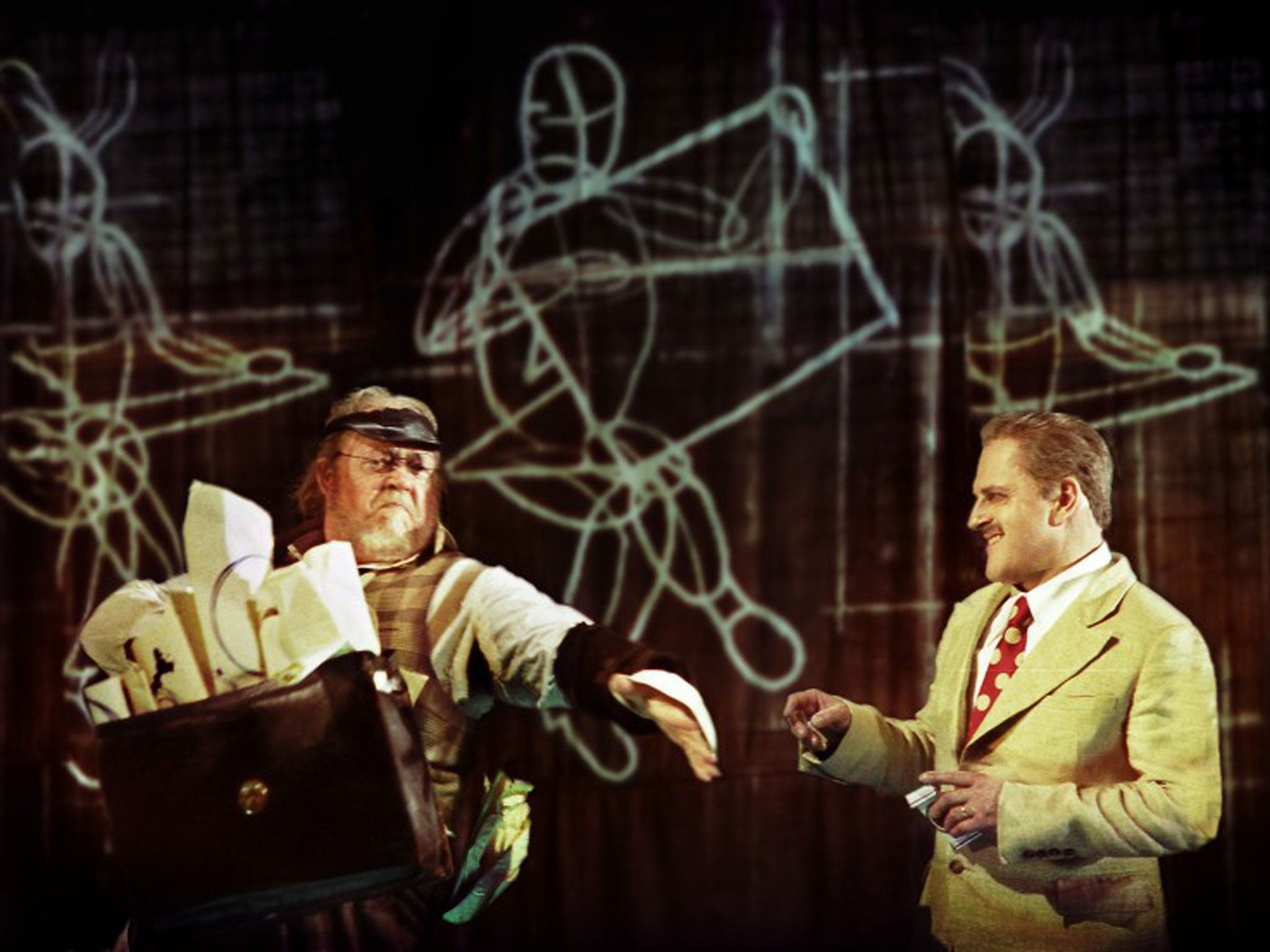Classical review: The Perfect American - Are you a man or a mouse, Walt?
If only the latest opera from Philip Glass had a squeak of the wit, drama and character of the great animator's creations

Early on in Phelim McDermott's production of The Perfect American for ENO, there is a moment that encapsulates the tension in Philip Glass's latest opera. Lit by the flicker of a giant film projector and dressed in the uniform waistcoats and visors of old-style animation artists, the 10 actors of the Improbable Skills Ensemble hold up 10 identical drawings of three perfect circles, one large, two small. It is up to the audience to reimagine those circles – to turn the large one into a face and the small ones into ears, and make the vital connection to the trademark-protected cartoon rodent first seen on screen in 1928. As Walt Disney later said, "It was all started by a mouse."
While McDermott, his actors, designers Dan Potra and Jon Clark, and the video artists of 59 Productions dance nimbly around the legal issues, alluding to the earliest Disney cartoons without infringing copyright, it is up to bass-baritone Christopher Purves to animate the character of Walt from Rudy Wurlitzer's decaffeinated libretto and Glass's matter- of-fact vocal lines. The Perfect American opens in 1966 in St Joseph's Hospital, Burbank, California, where Disney lies dying of lung cancer. A magnetic performer with a handsome, muscular voice, Purves wrestles with a scrim-thin sketch of a man described as "all folklore, apple pie and popcorn".
In the opera, it is all started by an owl: Rosy Lomas's bird-headed shaman, Lucy, who serves to remind Walt of an unpleasant incident in his past. Dialogues with Walt's nurse (Janis Kelly), his wife and daughters (Pamela Helen Stephen, Sarah Tynan, Nazan Fikret), and his brother Roy (David Soar), add further information. Through them we learn that young Walt stomped an owl to death in terror; that old Walt is anti-Union and anti-civil rights; that he fetishises his childhood home in Missouri; that he converted Ronald Reagan from Democrat to Republican; that he was capable of cruelty and tenderness; that he was not cryo-preserved but cremated. Still, Disney remains, like Mickey Mouse, two-dimensional.
The Act I finale, in which Walt rebukes an animatronic Abraham Lincoln (Zachary James) for the abolition of slavery, is ghoulishly amusing but heavy-handed. Andy Warhol (John Easterlin) has a tastelessly directed mince-on part to remind us that Walt's vision of America as the "birthplace of wonder and innocence" was already outmoded in 1966. Only Dantine (Donald Kaasch), a fictional animator fired for organising a union, is allowed to develop, passing from rage to regret.
The chorus regurgitates babytalk – "Quack-quack! Woof-woof! Choo-choo!" – while fairground orchestral arpeggios circle prettily under the baton of Gareth Jones, enlived by Latin percussion. Shorter than Glass's Satyagraha and more varied in instrumentation, The Perfect American still feels long. The irony is that in terms of character development, dramatic impetus, musical colour, pathos and wit, Dumbo and Pinocchio have more to offer.
Written for a student production, Eugene Onegin (Grange Park, Hampshire ***) is stubbornly difficult to cast. Too mature and sophisticated in their bearing for the first five of Tchaikovsky's seven lyric scenes, Susan Gritton's Tatyana and Brett Polegato's Onegin come vividly to life in St Petersburg, the shame of their youthful encounter in the country now as hot and sweet as the jam that silly, flirty Olga (Frances Bourne) dropped into the mouths of the peasant boys a liftime earlier. Bourne is the perfect age for Olga but Robert Anthony Gardiner still needs to grow into the role of Lensky. Clive Bayley's authoritative Gremin is a highlight in Stephen Medcalf's cautious Grange Park production. Designer Francis O'Connor's ornate spiral staircase and gallery dominate the stage, cramping the dances – an effect compounded by Martyn Brabbins's athletic tempi. Now that artistic director Wasfi Kani has lured the Bournemouth Symphony Orchestra into Grange Park's tiny pit, perhaps she can seduce its chief conductor, Kirill Karabits too.
A world away from Tsarist Russia, Opera Holland Park launched its season with a slug of red wine and a triple homicide. Stephen Barlow's artfully linked double bill of Mascagni's Cavalleria rusticana (****) (set here in 1944) and Leoncavallo's Pagliacci (updated to 1974), hinges on the volatile dynamic between Peter Auty and Stephen Gadd, both electric. Auty sings Mascagni's zipless Turiddu and Leoncavallo's vengeful Canio, while Gadd slips elegantly from the role of cuckolded Alfio in the first opera to the Iago-like Tonio in the second. Yannis Thavoris's sets offer two walls of orange crates, with appropriate period accessories. Though Mascagni was the innovator and Leoncavallo the imitator, Pagliacci is the stronger show. Julia Sporsen's alley cat Nedda matches Auty and Gadd in intensity. In Cavalleria, Gweneth-Ann Jeffers's Santuzza is too passive and Sarah Pring's Mamma Lucia becomes the dominant female. Conductor Stuart Stratford moulds and propels both scores magnificently, and special honours go to the four cellists of the City of London Sinfonia for the verismo sob in their sound.
'The Perfect American', to 28 June; 'Cavalleria rusticana'/'Pagliacci', to 28 June; 'Eugene Onegin', to 11 July
Critic's Choice
Thomas Zehetmair and Northern Sinfonia conclude their double-cycle of Schumann and Brahms symphonies at The Sage, Gateshead (tomorrow/Sunday). Theatre of the Ayre and the Ukulele Orchestra of Great Britain celebrate the music of the 17th-century lutenist Robert Johnson and his blues guitarist namesake in The Devil at the Crossroads, at the Spitalfields Festival, London (Mon). Gerald Barry's The Importance of Being Earnest opens at the Linbury Studio, London (Fri).
Join our commenting forum
Join thought-provoking conversations, follow other Independent readers and see their replies
Comments